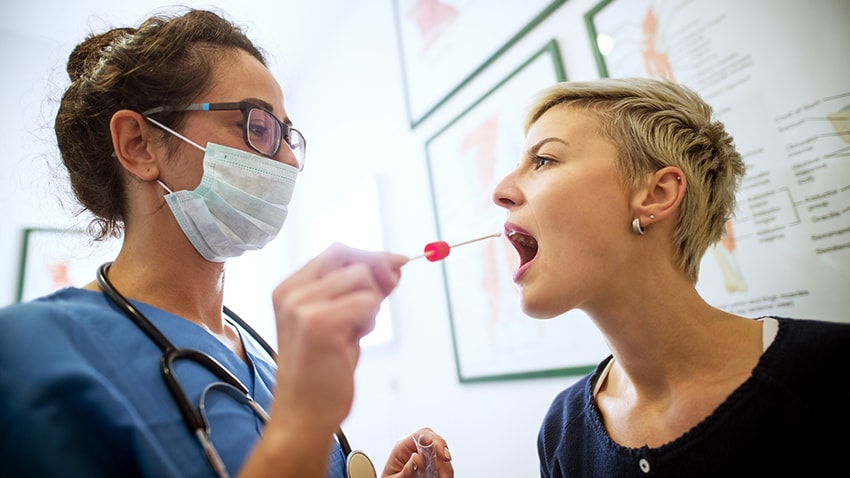Breast Cancer Genetic Testing

If you have a family history of breast cancer, you may also be at higher risk of developing the disease. This knowledge can boost surveillance and prevention efforts.
One in 8 American women will be diagnosed with breast cancer in her lifetime. Among all cases, about 10 percent are caused by the inherited genetic alterations BRCA1 and BRCA2.
But many at-risk women don’t know they’re predisposed.
That’s where genetic testing can play a role, says Sofia Merajver, M.D., Ph.D., director of the Breast and Ovarian Cancer Risk and Evaluation Program at the University of Michigan Rogel Cancer Center.
Identifying whether your risk is increased by the presence of these alterations can prompt proactive surveillance, medication or surgery.
“To act on potential high-risk mutations that you may carry is the No. 1 way to help prevent undesirable outcomes from cancer,” Merajver says.
She answered common questions about the practice:
Genetic testing for breast cancer
How do I know if I might have a genetic risk and need to be tested?
Merajver: You should consider genetic counseling if you have had a previous cancer diagnosis or if you have first- or second-degree relatives with breast or ovarian cancers -- or other cancers -- especially if they were diagnosed before the age of 50.
It’s difficult to impart hard-and-fast algorithms, though. They’re complex. The most important thing to know is that it all starts with a good family history. Patients should bring up family history with their doctors all the time and inquire whether it is relevant to their health management.
We try to do three generations at a minimum. Inquire and investigate your family history through relatives near and far. Reach out to family in other countries and other regions of the country and try to find out how they’re doing and if they have already had any genetic testing done. It is in your best interest, and you may have information to convey to them.
Gathering your family history is a huge gift for yourself, your siblings, your children and generations to come.
How early should I be thinking about genetic testing?
Merajver: If you have a family history of cancer, you should make sure your primary care physician is aware. Talk to them about if and when you should meet with a genetic counselor.
For most people, we don’t recommend testing for cancer susceptibility genes before they are 18. There are some exceptions, but those tend to be rare and only when there is a lot of cancer in the family or if there is a relative in the family who has a diagnosed genetic mutation.
What happens when you meet with a genetic counselor?
Merajver: Patients who have been referred to a genetic counselor should expect to be asked to provide a very thorough family history, which they will discuss in detail with the counselor.
Then they should expect to be given a plan of either suggested genetic testing or a plan for screening for early detection or a plan for prevention of cancer by other means, such as medication, if no testing is appropriate or they don’t want to be tested.
What do genetic testing results mean?
Merajver: If you have a negative result from genetic testing, it means that you do not have a genetic mutation in the genes that were tested that would increase your risk for cancer and that your chance of developing cancer can be adjusted downward. You may be counseled over the phone and sent a letter with screening recommendations.
If your test comes back with intermediate results, or what we label “variants of uncertain significance,” it means that we see changes in the genes but cannot determine whether they would be likely to lead to cancer.
With this result, you would be offered an in-person visit and get a detailed plan that covers the advantages of exercise, nutrition and screening in cancer prevention.
What happens if I get positive results back from my genetic test?
Merajver: It’s important to know that even if you test positive for an inherited cancer-predisposing genetic mutation, it doesn’t mean that you will definitely develop cancer. If you have a positive result, we will discuss the different ways available to manage risk.
We think of risk in two ways: the risk of ever being diagnosed, which can be managed with surgery or medication, and the risk of dying from cancer, which can be diminished by catching the cancer early through enhanced surveillance.
What people choose can depend on their perception of risk. For some people, a 20 percent risk is not very high; for others, that number seems extremely high.
It can also depend on what stage you are in life. If you haven’t had children yet, you would not want to remove your breasts (if you plan to breastfeed) or your ovaries, for instance.
There are lots of opportunities to be flexible. The plan is not the plan forever but can be revised with life events or passage of time. This is really personalized medicine.
